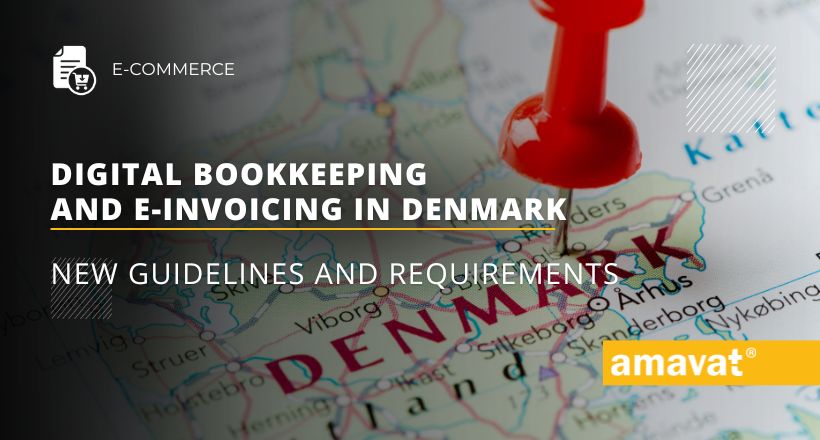Digital bookkeeping and e-invoicing in Denmark: New guidelines and requirements
In Denmark, digital bookkeeping is becoming a mandatory element of financial management for commercial enterprises. The changes in regulations aim to simplify accounting processes, increase transparency, and enhance financial control. According to the Danish Bookkeeping Act and relevant Executive Orders, all businesses must adapt to a digital bookkeeping system within a specified timeframe.
Implementation timeline for digital bookkeeping in Denmark
Under the new regulations, the requirement to use digital bookkeeping systems will be introduced in phases:
- From July 1, 2024: Companies required to submit annual financial reports under the Financial Statements Act must start digital bookkeeping from the beginning of their new financial year if they currently use a registered bookkeeping system.
- From January 1, 2025: Companies that are required to submit annual financial reports and currently use an unregistered bookkeeping system must also implement digital bookkeeping from the start of their new financial year.
- From January 1, 2026: Sole proprietors with an annual net turnover exceeding DKK 300,000 for two consecutive years (e.g., 2024 and 2025) will also be required to use a digital bookkeeping system from 2026.
Objectives of digital bookkeeping
The primary goal of digital bookkeeping is to ensure accurate tracking of transactions, maintain control over records, and safeguard and protect accounting data. These systems must allow for the storage of records for at least 5 years after the end of the relevant financial year. Additionally, digital bookkeeping systems must support functionalities such as e-invoicing, SAF-T reporting, submission of annual financial reports, and VAT declarations.
Accounting standard usage models
Digital bookkeeping in Denmark offers three models for using the standard chart of accounts:
- Direct use of the public standard chart of accounts: Companies may choose one of several available solutions that fully utilize the standard chart of accounts.
- Use of the provider’s accounting system: Companies can use their own chart of accounts adapted to the public standard chart of accounts and standard VAT codes.
- Chart of accounts mapping tool: Companies can use tools that enable them to map their own chart of accounts to the public standard chart of accounts.
Technical requirements for accounting systems
Accounting systems must meet several key technical requirements:
- E-invoicing: Systems should support e-invoicing, both within the digital standard accounting system and through access to an external provider. They should handle two document standards: OIOUBL and Peppol BIS.
- SAF-T reporting: Systems must be capable of generating SAF-T reports in compliance with the standards set by the authorities.
- Submission of annual financial reports: Systems must support the submission of annual financial reports in formats accepted by Regnskab Basis or Regnskab Special.
- VAT declarations: Systems must facilitate VAT declaration submission through the Danish Tax Agency’s VAT API (NemVirksomhed). While systems must support accurate processing and transmission of VAT data, the responsibility for the correctness of VAT declarations lies with the company, which must independently approve the final VAT returns.
External services and applications
Companies may use services and applications offered by external providers (third parties), such as e-commerce platforms or specialized systems. These applications must comply with digital bookkeeping requirements, ensuring their integration with company’s accounting system based on agreements with the provider.
Exceptions and special regulations
Not all activities are subject to the digital bookkeeping obligation. For example, foreign representative offices that only conduct promotional activities without actual sales transactions may be exempt from this requirement.
E-invoicing in Denmark
Since 2005, Denmark has mandated the use of e-invoicing in the Peppol BIS 3.0 format for government institutions and their suppliers (B2G). This system enables the transmission of e-invoices via the Peppol network, ensuring effective and secure connectivity with public entities registered in the national SMP NemHandel.
In the B2B sector, companies have the option to use e-invoicing on a voluntary basis, provided both parties to the transaction agree.
If you wish to learn about the implementation deadlines for mandatory e-invoicing in EU countries, we invite you to read our article: Mandatory e-invoicing for B2B and B2G in Europe: Implementation deadlines.
Summary
Digital bookkeeping in Denmark represents a significant step towards modernizing and simplifying accounting processes. The introduction of mandatory digital bookkeeping aims to increase financial transparency, improve data protection, and facilitate reporting processes. Companies must comply with the new regulations within the specified timeframe to ensure legal compliance and effective financial management.





